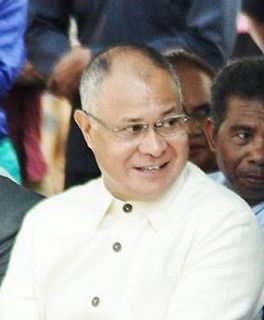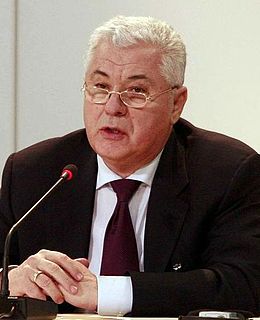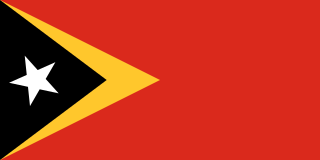
José Manuel Ramos-Horta is an East Timorese politician who was the President of East Timor from 20 May 2007 to 20 May 2012. Previously he was Minister of Foreign Affairs from 2002 to 2006 and Prime Minister from 2006 to 2007. He is a co-recipient of the 1996 Nobel Peace Prize along with Carlos Filipe Ximenes Belo, for working "towards a just and peaceful solution to the conflict in East Timor".

Kay Rala Xanana Gusmão, GColIH, GCL, GCMG is an East Timorese politician. A former militant, he was the first President of East Timor, serving from May 2002 to May 2007. He then became the fourth Prime Minister of East Timor, serving from 8 August 2007 to 16 February 2015. He has been Minister of Planning and Strategic Investment since February 2015.

Politics in Portugal takes place in a framework of a unitary semi-presidential representative democratic republic, whereby the Prime Minister of Portugal is the head of government. Portugal has a multi-party system. The President of Portugal is the executive head of state and has several significant political powers, which he exercises often. Executive power is exercised by the President and the Council of Ministers. Legislative power is vested in both the government and the Assembly of the Republic. The Judiciary of Portugal is independent of the executive and the legislature.

Politics of East Timor takes place in a framework of a unitary semi-presidential representative democratic republic, whereby the Prime Minister of East Timor is the head of government and the President of East Timor exercises the functions of head of state. East Timor has a multi-party system. Executive power is exercised by the president and the government. Legislative power is vested in both the government and the National Parliament. The Judiciary is independent of the executive and the legislature. The East Timorese constitution was modelled on that of Portugal, though the president is less powerful than their Portuguese counterpart. The country is still in the process of building its administration and governmental institutions. The Economist Intelligence Unit has rated East Timor as "flawed democracy" in 2016.

Presidential elections were held in East Timor in 2007. The first round on 9 April 2007 saw six of the eight candidates eliminated. The remaining two candidates, incumbent Prime Minister José Ramos-Horta and FRETILIN President Francisco Guterres, faced each other in a runoff election on 9 May 2007. Ramos-Horta won the second round with 69% of the vote.

A parliamentary election was held in East Timor on 30 June 2007. Although a narrow plurality was achieved by the Revolutionary Front for an Independent East Timor (FRETILIN), a coalition involving the next three largest groups formed a government. New Prime Minister Xanana Gusmão of the National Congress for Timorese Reconstruction (CNRT) was sworn in on 8 August 2007; Fernando de Araújo of the Democratic Party became President of the National Parliament.

The National Congress for Timorese Reconstruction is a political party in East Timor founded by former President Xanana Gusmão in March 2007 in preparation for the 2007 parliamentary election.

Fernando de Araújo, also known as Lasama was an East Timorese politician who was President of the National Parliament of East Timor from 2007 to 2012. He also served as the Acting President for two months in early 2008. He was also the President of the Democratic Party.

José Luís Guterres is an East Timorese politician and diplomat.

Vicente da Silva Guterres is a politician from East Timor, a member of the National Parliament of East Timor and its Vice-President since 2007.

Parliamentary elections were held in Nauru on April 26, 2008, following the dissolving of Parliament by President Marcus Stephen on April 18. The decision came after what Stephen referred to as "months of political deadlock". Of the parliament's eighteen members, nine supported the Stephen government and nine were in opposition.

Parliamentary elections were held in Moldova on 28 November 2010 after parliamentary vote failed to elect a President for the second time in late 2009.

A presidential election was held in Timor-Leste on 17 March and 16 April 2012 to choose a president for a five-year term. Incumbent president Jose Ramos-Horta, who was eligible for a second and final term as president, announced that he would seek nomination to be a candidate in the election. The election was seen as a test for the "young democracy" in seeking to take control of its own security. Former military commander Taur Matan Ruak provisionally beat Francisco Guterres in a second round runoff.

Frente de Reconstrução Nacional de Timor-Leste - Mudança, commonly known as Frenti-Mudança, is a political party in East Timor led by Vice-Prime minister José Luís Guterres.

Parliamentary elections were held in East Timor on 7 July 2012. The United Nations stated that it would withdraw its 1,300 troops if the elections passed off peacefully. The National Congress for Timorese Reconstruction, led by Prime Minister Xanana Gusmão, won the election with 30 seats, three seats short of a majority in National Parliament.

General elections were held in Cambodia on Sunday, 29 July 2018 to elect members of the sixth National Assembly. Polling stations opened at 07:00 and closed at 15:00. The number of registered voters has decreased for the first time since 1993 and was down 13% from the 2013 general elections.

Parliamentary elections were held in East Timor on 22 July 2017. FRETILIN narrowly emerged as the largest party in the National Parliament, winning 23 seats to the 22 won by the National Congress for Timorese Reconstruction, which had been the largest party in the outgoing Parliament.






















